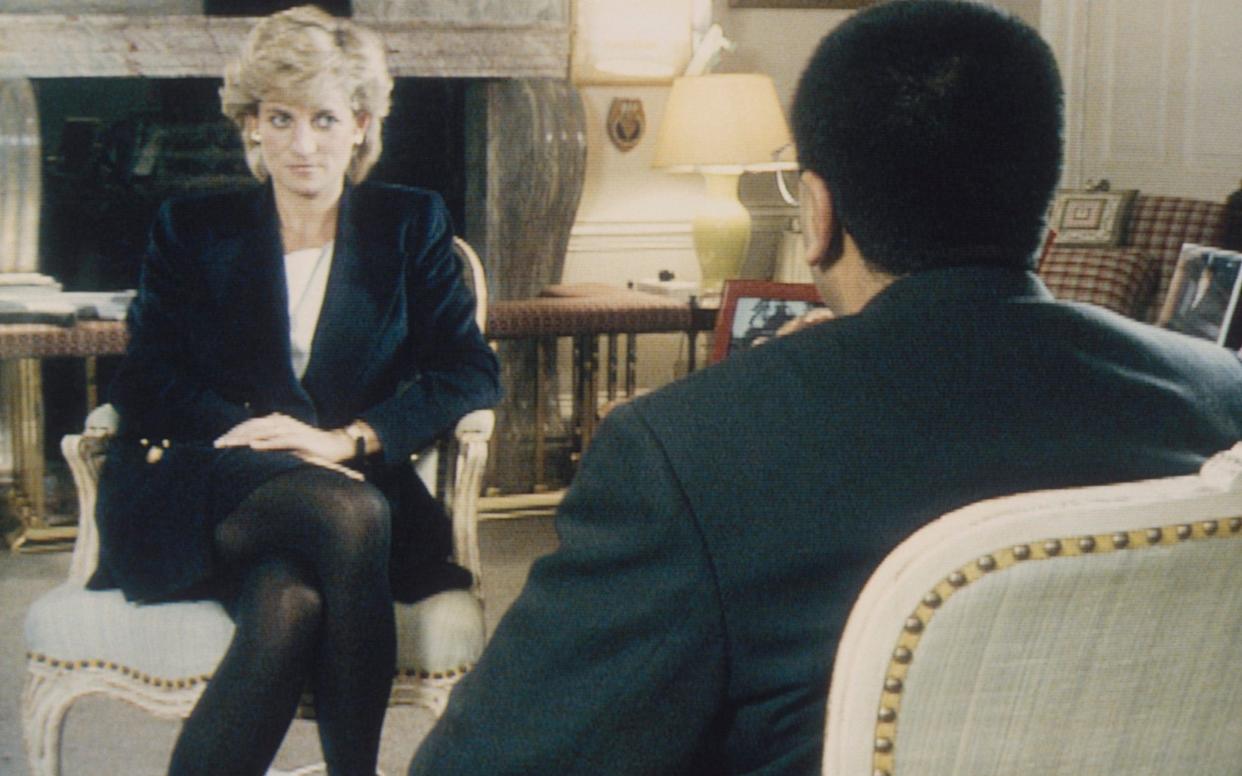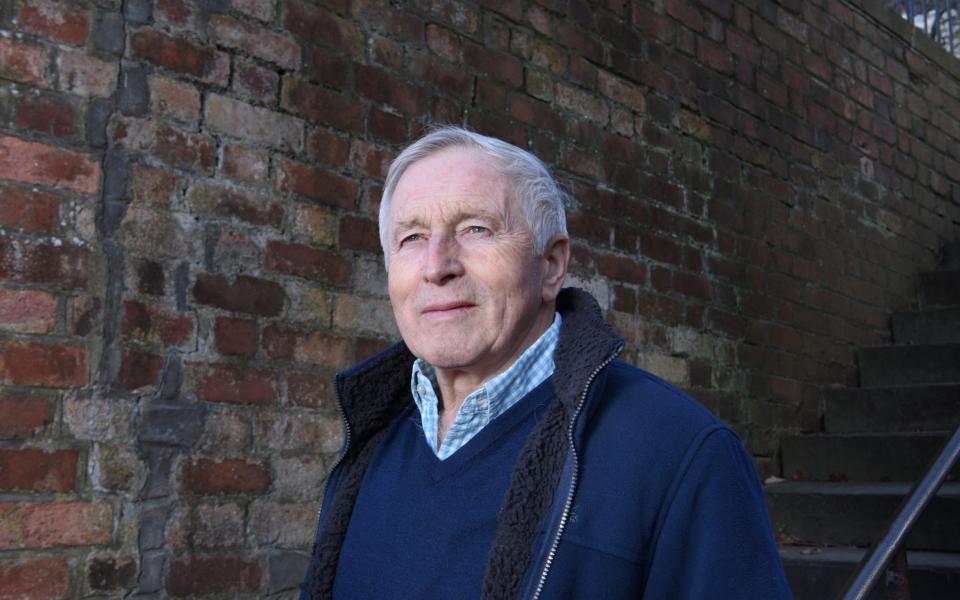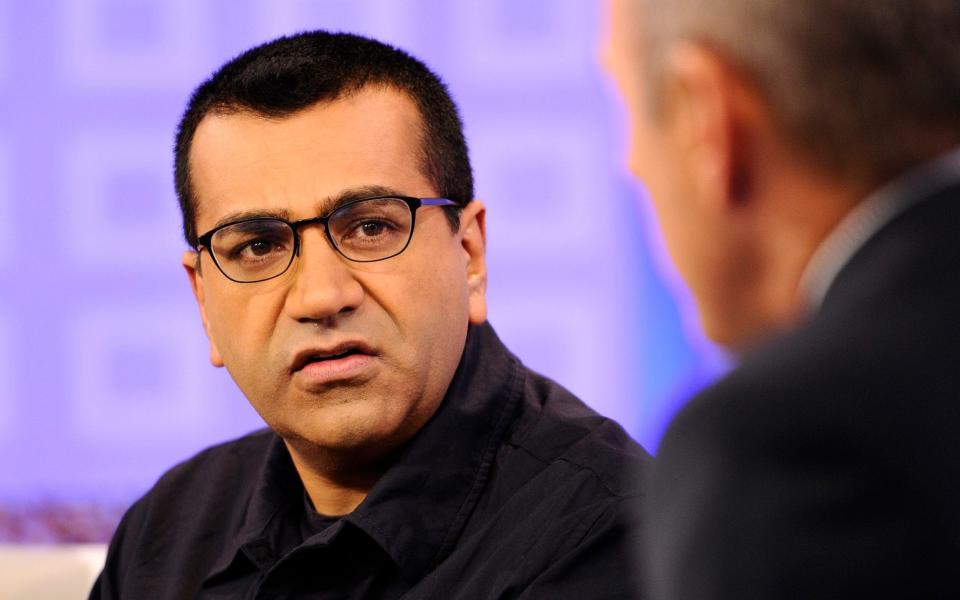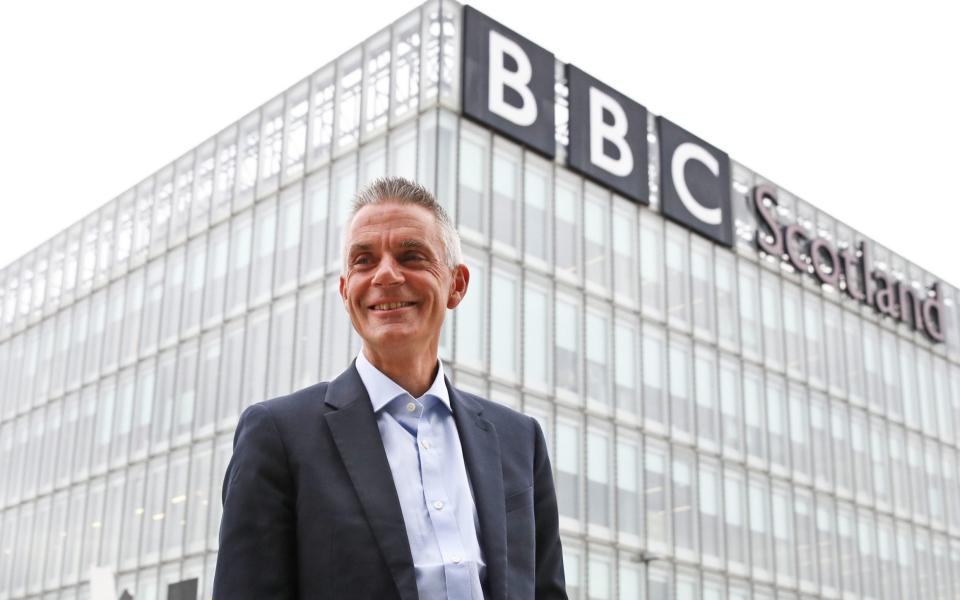Jonathan Dimbleby on Diana's Panorama: 'If you know someone is vulnerable, you must not exploit that'

- Oops!Something went wrong.Please try again later.
- Oops!Something went wrong.Please try again later.
- Oops!Something went wrong.Please try again later.
Twenty-five years ago, the interview given by Diana, Princess of Wales to Martin Bashir, which went out on BBC One on 20 November 1995, provided one of the journalistic scoops of the century. Almost 23 million people watched arguably the most famous woman in the world discuss her marriage to the Prince of Wales, her relationship with the Royal Family and the pain of her private life. It made headlines around the globe.
For the Princess, it deepened the public’s sympathy with her, yet only intensified the glare from television, press and paparazzi, opening the door to further intrusion. Diana clearly trusted Bashir, but his questions probed and probed. And for him it was career-making, a calling card without equal that allowed him to secure many more prized interviewees, including, in 2003, Michael Jackson.
Now, following fresh claims that deceitful tactics, including fake documents, were used to win the trust of Diana’s family, the BBC’s new director general Tim Davie has pledged to hold a “robust” and independent investigation into the affair, which had already been scrutinised in an internal inquiry in 1996, led by the BBC’s then head of news, later D-G, Tony Hall. A searingly bright light has again been turned upon the corporation, which cleared Bashir of wrongdoing at the time.
I asked experienced television interviewers about the ethics of interviewing, and particularly of interviewing vulnerable people, beginning with the respected broadcaster and author Jonathan Dimbleby, who describes the Diana scandal as “the bizarre and awful story of Martin Bashir’s insinuating himself into the confidence of a troubled woman”.
“I think it's very important that there is a full independent inquiry,” he tells me. “The truth, whatever it is, and insofar as it’s ascertainable, has to come out, because the reputation of the BBC is at stake now, as well as the impact on her family and on the institution.”

I ask him where he thinks the line is in persuading perhaps reluctant interviewees to talk, and what is acceptable in trying to encourage them to open up once on camera. “It can be done by a variety of means,” he says. “But none of them should involve deception and lies; none of it should involve that disgraceful way of abusing people.”
Dimbleby, of course, is the second son of Richard Dimbleby, who set the tone for BBC interviews on Panorama in the Fifties. He’s also the writer of the 1994 biography of the Prince of Wales, referred to several times in Bashir’s interview, which revealed that Prince Charles had renewed his earlier relationship with Camilla Parker-Bowles, now Duchess of Cornwall, around 1986, five years after his “fairy-tale” wedding to Diana.
In a 50-year career in hard-hitting television journalism, Dimbleby has been no stranger to controversy. He presented Thames Television’s 1988 documentary Death on the Rock, about the shooting of three unarmed IRA members in Gibraltar, which so enraged Margaret Thatcher’s Conservative government that it is considered by some to have contributed to Thames losing its ITV franchise in 1990.

“You don't have to show your hand every time you’re doing an interview,” Dimbleby says, “[you don’t have to] say, ‘I want to interview you, because I know you've got something very important and painful you need to express.’ You give an indication of the context in which the interview is being done, [which] I think is very important. You cannot say, I want to talk to you about (a) when in fact you want to talk to someone about (z), but you don’t have to provide the truth, the whole truth and nothing but the truth.”
He describes how in the days of filmed interviews, because film was so expensive, when shooting in disaster zones or war zones, one might say to the cameraman, “let’s use the strawberry filter on this one”, which was code to not begin rolling while the interviewee was asked soft questions which made them feel comfortable, before switching to the important ones – “you wouldn't immediately say to the interviewee, I know that you are responsible for shooting innocent people.”
As he and other film-makers I talk to make clear, ethical standards always apply, even when dealing with criminal or lying characters.

We talk about situations in which the interviewer may have some foreknowledge that the interviewee’s answers could be potentially damaging to them, as may have been the case with Diana. “If you know someone who is weak and vulnerable for whatever reason, you must not exploit that unless there is a massively bigger public interest at stake,” Dimbleby says. “You simply should never do that.”
Diana was particularly vulnerable at that time, wasn’t she? “She was vulnerable. He might well have thought that she was susceptible to doing an interview because, as we now know… [Andrew Morton’s] book about Diana had come out, on which she had collaborated.”
The question of Diana’s vulnerability is one I also raise with documentary maker Sue Bourne, whose remarkable, sensitive films for the BBC, such as The Age of Loneliness (2016) and A Time to Live (2017), about people facing terminal illness, have demanded enormous care. “When I did The Age of Loneliness, a lot of people in that were terribly vulnerable, because the reason they were lonely was that they didn't have any friends, and they didn’t have anyone to talk to… I remember one woman, where I said, ‘Look, I'm asking an awful lot of you, I’m asking you to bear your soul on television. And I know your default position is to say, “Oh, I’m fine,” and I don't want that, I want you to tell me how you really feel. And if you're not willing to do that, then don't be in the film, because I don't want to put you in a difficult or a dangerous position.’
“And she did give me one of the best interviews in the film, and it was heart-breaking when she told the truth… but I am also years after the event, still talking to them, and making sure they're alright.”
"Quite often, I won’t have people in my films – even if their story is great – if I think they are too vulnerable," she adds, explaining that she is aware that she can't control the aftermath of appearing in a documentary, in the press and on social media.
I ask her if knowing Diana’s situation, and the difficulties she had been through, would she be the sort of interviewee that she would be particularly careful with? “Of course,” she says. “Equally, If I'd had access to Diana, I'd have been delighted, because I’d have thought, bloody hell, this is dynamite. You know, [Diana saying] ‘there’s three people in this marriage’… You’d have been torn morally between the fact that you had access to this person, and they were about to give an utterly sensational interview that would have blown everything apart, blown the Royal Family up. So yes, I would have given my eye teeth for it. And I would assume that you would have talked to her about, did she understand the implications of what she said? But I would not be using unscrupulous methods to persuade her to do the interview.”
One film-maker talks to me off the record about how in news documentaries, it is common to use leverage to get reluctant interviewees to talk: “If you're doing an investigation into a particular industry, and you want the leaders of that industry to talk, but none of them are talking… If you manage to get one of them to talk, you then take their comments, and go back to all the others and say, ‘do you really want this person to be the spokesperson for your industry?’ So you're being manipulative in that way, but to me that’s just good journalism. You’re kind of twisting people's arms.
“I think the place where you have to draw the line with any kind of manipulation that is intended to leverage a response is that, at the very least, what you’re saying has to be true. I mean, if it’s not, that's obviously wrong.”

